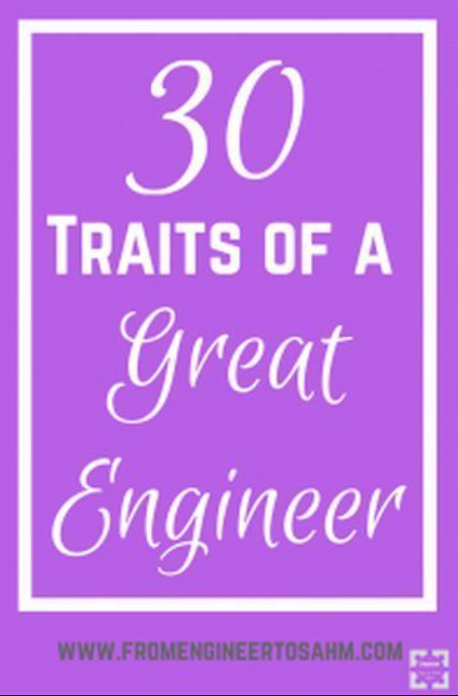I have written a couple of posts on why you should be an engineer. But what does it take to be an engineer? Most people would assume you would need to be good at math, and like to work alone. But during my over 10 years of working in engineering, I learned that a lot of these perceptions of engineers are wrong. In the corporate world I found working with others was a must, and that I was hired as engineer for my ability to learn, not for what I already knew.
Several people have told me they would love to be an engineer, but they just can’t handle the math. If you want to know a little secret, most engineers hated their college math classes. They just got through the classes because they had to in order to get their degree. In the higher level engineering class, almost every problem is reduced to an algebraic equation. And when you are working as an engineer, there are various computer programs that will solve all the complicated math problems for you. An engineer just needs to be able to determine if the outcome from the software makes sense.
So if being good at math and wanting to work alone are not requirements to be an engineer, then what is? To find out, I asked 20 of my engineering friends and colleges what it took to be an engineer.
Here is the list of the character traits a great engineer I must have. See if your perspective of what an engineer does changes!
- Attention to detail!
- Critical thinking/analysis.
- Persistence (GIT ‘R DONE)
- Willingness to learn.
- Ability to learn.
- Ability to work on a team with people of various backgrounds.
- Sometimes you need to have small fails to explore an idea and learn.
- Having a mindset that it is not a problem, just another “challenge” or “opportunity”. Some of my most interesting projects were taking on things that “could not be done”.
- Ability to guide and teach others.
- Question Everything.
- Work ethic, ability to listen and team oriented.
- Able to think outside the box but even MORE willing to think there is NO box.
- Not be afraid to make mistakes or have a task “fail”. Some of the best invented stuff were “failed inventions”.
- Never stop trying and fearless!
- Willingness to not only think outside the box but to turn it upside down and set it on fire.
- Hands on mechanical aptitude and social skills are where it’s at. There’s little room for old school socially inept non-communicators in today’s business environment. You have to be able to define it, design it, build it and sell it if you are going to be successful.
- Humility. You will miss out on valuable information when you start believing you know more or are better than someone else. Some of the best information I gathered during my time in plants was from the operators and mechanics.
- Pocket Protector
- Working on teams is SUPER important. Being able to think outside the box is also important but sometimes you just need to crawl inside the damn box and make shit work.
- Persistence, curiosity, dedication, a dreamer that knows how to execute ideas, a good listener, hungry for knowledge.
- Designing practical solutions to improve the quality of life for mankind in some way, shape, or form.
- Understanding and accepting that the consensus of the team is more important than your bright ideas… You may have the best idea, but if no one else agrees to execute it, it will fail.
- Fail fast, fail cheap… Learn, repeat.
- Learn the financial impact of your work. Everyone speaks and understands money, only a select few speak engineer.
- Listen to your customers… And make sure you know who your customers are. Also, don’t be afraid to fail.
- You cannot be afraid to fail. To fail means it is just your “First Attempt In Learning”.
- Be willing to ask questions. It is better to humble yourself and get it right than assume and complete screw up.
- The 3C’s of good engineers are to be confident, competent, and a little bit cocky.
- Do not succumb to paralysis by analysis.
- Engineering is such a wide field that there is no one prescription. What makes a good engineer will vary by company and culture. You have to desire the culture you’re in. Yes culture can change and you can drive that change but you have to fit first, you can’t come in guns a blazing. Beyond finding the culture that fits, you must have determination / tenacity, a desire to learn, and confidence (borderline cockiness but it must be tempered and used when necessary).
While I watched the responses come in, I was amazed at how different they were from one another. I also noticed the individual’s personal work experience reflected their response, which led to differing of opinions. It not only depended on the particular position that person had, but the industry they worked in. But overall, the general consensus was that to be an engineer you need to be able to work with others and to work hard. Nothing about math. So stop letting math be the reason you do not pursue engineering. If like to solve problems, work with others, and love to learn, try engineering. You will be surprised at the doors it will open.
